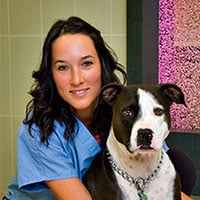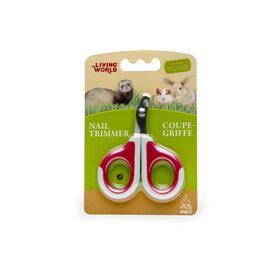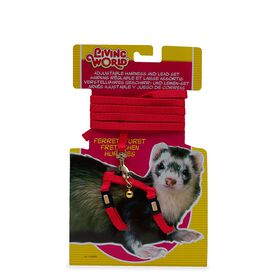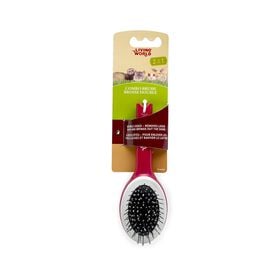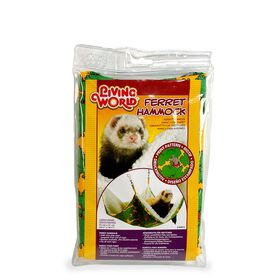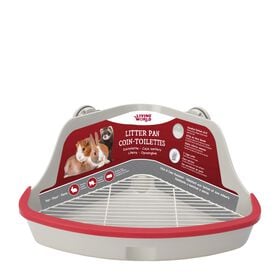Ferrets are wonderful creatures to have as pets, and they can live up to 8-10 years old! They’re busybodies who love to play — they’ll have you laughing out loud, and falling in love with them. However, ferrets need a lot of care and can’t spend the day in the cage. They need games in order to be stimulated and alert, but they also need to sleep for 12-16 hours per day.
Ferrets are predators. If you have birds, fish or other small mammals in the house, be sure to take precautions to avoid any accidents. That said, they get along very easily with cats and dogs, depending on their temperament. By introducing them gradually and training them properly, you both can live happily ever after together!

What kind of environment does a ferret need?
- Grilled cage with baskets measuring 75 x 100 x 75 cm
- Food bowl
- Water bottle
- Litter: compressed paper (no wood chips or pellet-based litters as these can be swallowed.)
- A foundation of newspaper and cardboard
- Hiding space: a box or cover that can’t be shredded
- Safe toys inside the cage: paper bag, plush toys for cats and dogs, crumpled paper, etc.
- Make sure your house is ferret-proof! This means sealing off any gaps or holes, hiding electrical cords and not leaving anything on the ground!

Basic care of the ferret
Ferrets are sterilized and vaccinated before being adopted, and their anal glands are removed. They can sometimes suffer from distemper, which is a fatal illness that creates digestive, respiratory and neurological issues. It is therefore important that your ferret be vaccinated at two months of age, with repeats at three and fourth months in order to ensure adequate protection. The rabies vaccine is also administered during the final repeat for distemper, at four months of age. After that, vaccines should be done yearly. If you find your ferret has a strange odour, this may be caused by secretions from the sebaceous gland. As such, be sure to clean their covers more frequently in order to minimize the odour in the home. Also, avoid washing your pet too often — this will simply increase secretions from the sebaceous gland, whose role is to balance the natural oils in the skin.
These are some of the most common illnesses that affect ferrets:
- Insulinoma: A small cancerous mass on the pancreas which increases insulin production, resulting in a drop in sugars in the blood, which can lead to hyperglycemia. If you notice your little buddy is tired or less active, you should contact a vet.
- Illness in the adrenal glands: Do you notice your ferret losing a significant amount of fur to the point of being almost bare? Have you noticed changes in their behaviour, i.e., more aggression, or itching? This could mean deregulation in the adrenal glands. Treatment for this condition involves inserting hormonal implants under the skin to account for deficiencies in the glands. As always, be sure to contact your vet [French only link] right away!
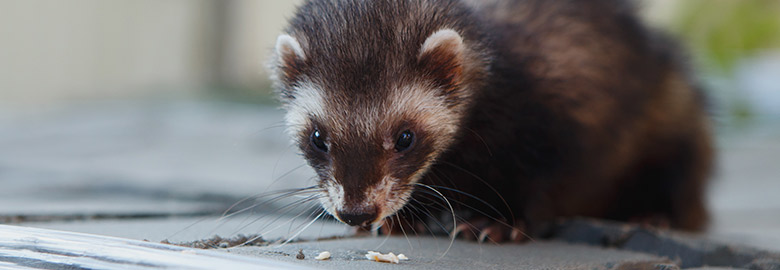
What does a ferret eat?
These little clowns are strict carnivores, and have a simple and small digestive system. Their food should be rich in nutrients and minerals with at least 30-40% protein, 15-20% fat, and 3-4% fiber. We recommend using food that has been specially developed for ferrets, though high-quality cat food are also an option. Ferrets are not prone to obesity and can self-regulate their weight pretty well. This means you can feed them all the food they want! As far as treats go, you can give them cooked fat- and spice-free chicken, beef, fish, and meat-based treats!
Ferrets don’t need carbohydrates, as their systems are not equipped to digest them. Therefore, it is best to avoid milk-based products, as well as pasta, cereal, cookies, bread and any products rich in sugar. Bones are also to be avoided, as these can cause diarrhea, irritation, and obstructions in the digestive system.
Beware of the potential dangers!
Due to their curious nature and sticky fingers, ferrets have a tendency to stuff anything and everything into their mouths. Be careful of earrings, rubber balls or other objects that can be swallowed and cause obstruction in the digestive system: this could require surgery. Also, sofa beds and couches can be extremely dangerous for these little snoops! They can easily get stuck under them and hurt themselves or be crushed. Electrical outlets, dressers and plants can also cause injuries or intoxicate them. Make sure your house is prepared before you adopt!

